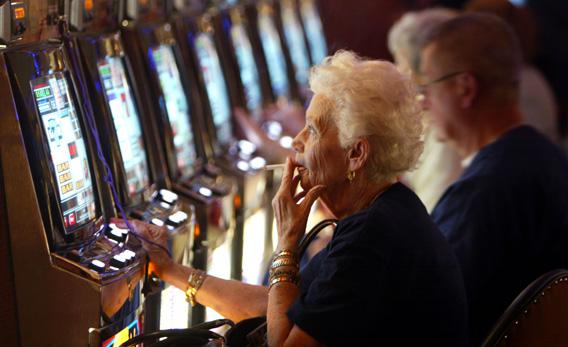This fall in Maryland, the hot election has nothing to do with Mitt Romney and Barack Obama. The GOP has surrendered Maryland’s electoral votes to Obama, and is barely managing to mount a campaign against incumbent Democratic Sen. Ben Cardin. But Maryland has become ground zero for an incredibly expensive ballot-initiative campaign—though not the one Marylanders expected. Earlier in the year, Gov. Martin O’Malley was prepared for a tough battle over a same-sex marriage referendum. Instead as much as 90 percent of initiative-related spending in the state has focused on Question 7 about gambling.
The controversy is taking supporters by surprise, because a predecessor referendum expanding gambling—2008’s Question 2—sailed through the electorate quite comfortably with 58 percent of the vote, bolstered by gambling supporters’ enormous spending edge of $7.1 million to $1.1 million.
This time around, things look different. A recent Washington Post poll shows the electorate evenly divided and even though supporters of more gambling have raised a whopping $23 million they’re being slightly outspent this time around. What’s changed is not a sudden surge of religiously motivated opposition to gambling or striking new evidence about its impact on crime. Maryland’s well-financed opposition to casino gambling comes from other casino interests
Specifically casino interests in Charles Town, W. Va. The convoluted geography of the region means that a little dangling bit of West Virginia is only 90 minutes from the Baltimore-Washington Metropolitan Area.
The Hollywood casino in Charles Town, which got a major upgrade in 2010, is easily close enough for a weekend gambling outing. It is a complete hotel/casino experience featuring blackjack, craps, roulette, poker rooms, an Epic Buffet, and even the occasional Candlebox show.
It’s not Las Vegas, but it is lucrative for both owner Penn National and the state of West Virginia. Question 7 would ruin it all.
Allowing table games at Maryland’s existing five slots-only casinos and approving the construction of a sixth in Prince George’s Country just south of D.C. would ruin all that. A casino in the D.C. suburbs, another in Baltimore City, one in Hanover in between, and other scattered further from the region’s main population centers would kill Hollywood Charles Town’s business model.
But “you’re hurting our West Virginia business” isn’t a very persuasive argument in a Maryland referendum. The resulting dynamic is an instance of Bruce Yandle’s “Baptists and Bootleggers” model of regulation. Bootleggers benefitted financially from alcohol prohibition, but as states pondered the relegalization of alcohol following the end of the federal ban, bootleggers couldn’t invoke their own financial interests to halt legal liquor. What was needed was a tactical alliance with booze-hating Baptist preachers.
Similarly, in Maryland the public face of anti-casino activism is often preachers such as Pastor Heber Brown of Baltimore’s Pleasant Hope Baptist Church, who asked anti-casino demonstrators: “Why not have Maryland get into the heroin business or the prostitution arena? Then we can get our young folks internships down ‘the Block,’ so they can learn how to slide down that pole just right or sling that good stuff on the corner.”
The “No On 7” campaign also argues, accurately, that Maryland’s previous initiative didn’t yield gains as large as forecast (in part because West Virginia responded to Maryland’s slots by allowing table games as Charles Town), and that the revenue that’s supposedly earmarked for education won’t necessarily boost school funding. That’s true, because state budget revenue is largely fungible. Extra casino money for Maryland schools might ultimately result in lower non-gaming taxes, or a shift of funds into Medicaid, law enforcement, transportation, or some other state budget item.
Understanding the motives of the anti-casino forces is about all you need to understand why the case for Question 7 is so compelling. The West Virginia casino doesn’t like the idea because they think it will shift casino activity out of West Virginia and into Maryland. And that’s exactly why Maryland should do it. The state doesn’t need a casino on every corner, if that’s not what local people want, but there’s no good reason to lose out on the jobs and tax revenue by forcing people to drive to West Virginia to play a round of poker. Indeed, the deep logic of the situation is that now that casino gambling has escaped confinement to Nevada and Atlantic City it should spread almost everywhere. In New York City, a successful new casino in Queens is hammering Indian gaming revenue in Connecticut and spurring some talk of bringing gaming to Manhattan. It was Maryland’s opening of slots-only casinos that spurred West Virginia to bring table games to Charles Town and now the existence of those games is the best argument for building a casino in Prince George’s County. If that casino opens, putting a casino in D.C. proper will start looking appealing to city officials.
Whether you see the slide down this slope as good or bad compared to the old paradigm of nearly universal prohibition, there’s no real stopping it at this point short of federal legislation. Someday soon, every city will be Sin City.
